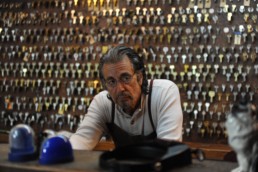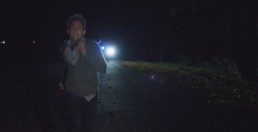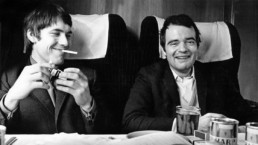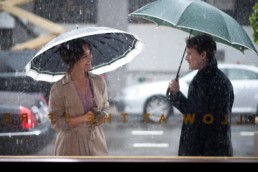Review: 'What Happened, Miss Simone?
This year has already positioned itself as a banner year for music cinema. This month has seen the celebrated releases of Eden, a love letter to the 90s Parisian electronic scene, and Love & Mercy, the idiosyncratic biopic of The Beach Boys' brainchild Brian Wilson, to glowing reviews. Brett Morgan’s chaotic Kurt Cobain documentary, Montage of Heck, revolutionized the structure of the rock-doc for a what may be the most personal peep into a musician’s life this decade, while the upcoming self-titled Amy Winehouse documentary, Amy, won over the likes of Cannes and critics thereafter as well. Debuting nationwide this week after its Sundance premiere alongside Montage of Heck, is What Happened, Miss Simone?, a documentary that follows the rise of "the high priestess of soul," Nina Simone.
What Happened, Miss Simone? is a very traditional documentary about the most un-traditional of musical artists. In an era of unconvention in documentary film making, Simone’s story is told in familiar fashion. The visual fabric of the narrative is predominantly archival–black & white performance footage and photography, radio interviews with Simone herself, etc.–which gives the film a very classic aesthetic. Simone’s story unravels like a VH1 Classic special, from her humble Carolina beginnings singing in her church, through her early jazz club days into her stern civil rights activism in the 1960s. There may be a little too much "Behind the Music," however.
Much like the title suggests, she presents her subject as a cautionary icon, an over-advocate whose own anger became a threat to her own wellness. It’s a cautionary tale for our own era of advocacy that reigns in this new century, though also a portrait of an artist we rarely see any longer in popular music.
Director Liz Fischer chooses to spend the heftiest portion of the film on Simone's political aggression, yet shies away from outright anointing her. Much like the title suggests, she presents her subject as a cautionary icon, an over-advocate whose own anger became a threat to her own wellness. It’s a cautionary tale for our own era of advocacy that reigns in this new century, though also a portrait of an artist we rarely see any longer in popular music–a pop artist innovating whilst making grand political statements. However, What Happened, Miss Simone? would stand out if it featured just that: more of Simone’s music.
To Fischer and her editing team’s credit, they have a keen sense of knowing to not cut from Simone’s performance footage swiftly. The film’s best moments are these extended single takes that let Simone’s undeniable presence on stage breathe and come to life. It is in these moments, the documentary is magnetic–it really does bring Simone back to life. Coupled with the extensive, well-restored interview audio of Simone herself, What Happened, Miss Simone? gives the chanteuse a voice again. And that is something that we need, especially in this second wave of activism.
What Happened, Miss Simone? will premiere exclusively on Netflix and opens theatrically in LA at Laemmle's Music Hall 3 Friday.
https://www.youtube.com/watch?v=moOQXZxriKY
Review: 'Manglehorn'
Some performers are so ubiquitous, so ingrained in the American cinematic consciousness that no matter how hard they try to break away – or in this case, reappear – their attempts seem futile. Al Pacino is one of those artists – one of the great leading actors of cinema’s young life. In the last year, independent Hollywood seems to have re-discovered his talents and finally re-adjusted his role. He is now the wise elder looking back at his better years with existential longing for the love and compassion of decades past. His last three lead roles - an aging mobster in Stand Up Guys, an aging actor in The Humbling, and an aging rock star in Danny Collins, all mirror his latest in the streak: the ever-prolific David Gordon Green’s Manglehorn.
Debuting on last year’s festival circuit in Venice and Toronto, Pacino’s eponymous Manglehorn is an aging locksmith who longs for Clara (Natalie Wilemon), the one who got away. Not much is revealed about her, or their relationship through Manglehorn’s voice-over musings, though it is clear that they had something very special. His emptiness hinders his connections with his successful yuppie son (Chris Messina), the charming bank teller he visits every Friday (Holly Hunter) and an old athlete from his high school coaching days who drags him into his greasy massage parlor (Harmony Korine), as he half-heartedly moves through the daily motions, finding little ways to reinvigorate his life and relationships.
It’s an awkward amalgam of indie drama and magical realism that on occasion, is exactly that – magical. In very specific moments, Gordon Green diverts from the stale narrative to give Manglehorn, the character, a mystical aura that is much more fascinating than his all-too regular story.
If this all sounds fairly flat – it is. Manglehorn is not a film that lacks any substance or style. It has plenty of both, though too much of it falls into the cracks in the subtext, and not enough appears on the screen. It’s an awkward amalgam of indie drama and magical realism that on occasion, is exactly that – magical. In very specific moments, Gordon Green diverts from the stale narrative to give Manglehorn, the character, a mystical aura that is much more fascinating than his all-too regular story. The ending, for example, may be among the most beautifully baffling final moments in recent cinema.
Unfortunately, there isn’t much to love about Manglehorn himself. Despite his cranky nature, he is endearing. However, this makes him so hard to understand, except through very vague voic-eover about his lost love Clara. Pacino does his best, though at times he feels almost too good for the movie. Harmony Korine and Chris Messina give strong turns in underwritten supporting roles, yet Pacino outshines them for simply, well, being Pacino.
This is the issue that comes forward in Manglehorn. It all feels like a Pacino vehicle, an outlet for a living legend to make a big return in a small feature. More than anything, it showcases David Gordon Green’s unique abilities for tonal shape-shifting, a technique that almost pays off for Manglehorn – a film that would work so well, if it only knew what is was really about.
Manglehorn opens limited in LA at the Sundance Sunset Cinema today.
https://www.youtube.com/watch?v=yoPT7UpEjro
Review: 'Shake the Dust'
Hip hop’s cultural dominance is unrivaled in today’s society. The influence of the movement that has blossomed from the streets of the Bronx in the middle of the 20th century has risen to monolithic proportions across the globe – and not only in music. Our fashion, our design, even the way we speak, are all peppered with the soul of the movement and its evolution from humble street corner reflections to big money hooks and diamond-grilled ridiculousness. Shake the Dust is the necessary film that traces hip hop’s roots by looking at the present– a necessary introspection that recaptures the original energy of a divided genre.
Shake the Dust is a documentary that follows an ensemble of hip-hop listening, breakdancing crews all over the world. Hopping between slums and impoverished inner city environments in Uganda, Columbia, Yemen and Cambodia, director Adam Sjöburg showcases the talents of youth who find an escape in the rhythms of hip hop culture. Shot with stalwart and spirited energy, the film is a patchwork of the children’s stories of hope and their rather impressive dance routines on their dusty neighborhood streets.
Shot with stalwart and spirited energy, the film is a patchwork of the children’s stories of hope and their rather impressive dance routines on their dusty neighborhood streets.
The film’s necessity comes from its enthusiastic look at the soul of hip hop. One that, in America, is slowly diminishing or becoming misconstrued. If anything, the film reveals that hip hop is a healing force – a storytelling device for young communities. This concept, often forgotten by the dollar-sign-eyed rappers of the modern hip-hop incarnation shines in Shake the Dust. Sjöburg is gifted in finding and sharing these young talents with the audience and linking the kindred spirits of breakdancers across the globe.
As energizing as the dancing may be, Shake the Dust feels stuck on repeat very early in the film. There is a lot of energy to the stories in this film though there is a lack of dialogue beyond the film’s surface subject. It’s understandable that a documentary about break dancing would be jammed with dance montages, but for an hour and a half it may be a bit too much. The dancing is the glue between each community though there is a lack of distinguishing philosophy behind each one. This communal nature of Shake the Dust is, however, what makes it sail across continents: a small, though important, victory for good old hip hop.
Shake the Dust opens in Los Angeles at the TCL Chinese Theater today, followed by a national, limited theatrical release. The film will be available on iTunes and additional VOD outlets on May 19.
https://vimeo.com/124246503
Review: 'The Surface'
The world, according to film, is very small. For blockbuster audiences, New York, London, Abu Dhabi and Rio are the usual vacation destinations filled with action stunts and speedboat chases that are, at once, both exhilarating and exhausting.
The Surface, a two-man thriller that made its festival run last year, finds tension in the most unlikely of locations: the empty waters of Lake Michigan and Milwaukee, Wisconsin. For the sheer fact that a local, independent film from an unsung American metropolis is reaching national theaters (in limited release) is a remarkable achievement and a reason to consider seeing an oddly compelling drama starring two longtime character actors despite it's very schematic and - pardon me - surface-level narrative.
Geek hero Sean Astin (The Lord of the Rings) stars as Mitch, a depressed Milwaukee fellow reeling from his life's misfortunes. While taking his father's vintage boat out on a day trip that he intends to be his last, he come across the wreckage of a plane crash in the middle of Lake Michigan along with its lone pilot survivor (Chris Mulkey, Captain Phillips). After pulling him to safety, Mitch's boat loses it's propeller, leaving the strangers stranded with only their troubled souls to keep each other afloat while the boat begins to sink.
For the sheer fact that a local, independent film from an unsung American metropolis is reaching national theaters (in limited release) is a remarkable achievement and a reason to consider seeing an oddly compelling drama starring two longtime character actors despite it's very schematic and – pardon me – surface-level narrative.
It's a simple set-up, reminiscent of 2013's magnificent All Is Lost in its conceit, though far less powerful. Where Lost found its power in the solitude of the ocean, Surface finds itself telling far too much back story about the shipmates' lives that is too poorly developed and overly melodramatic. Fortunately, and rather surprisingly, Astin's sea legs are strong and able to carry the 'made-for-TV' styled drama, and with great charisma. Mulkey does a good job as well and their chemistry is a casting miracle.
Surface's direction though, like these open seas, is choppy. Director Gil Cates, Jr. handles the conversations very well, with the result being effective chemistry. When it comes to adding narrative heft and tension, however, there is a lack of trust in the bleak setting and the quiet power of subtext. What makes Lake Michigan such an interesting setting is its close proximity to its shores. The sense of being lost on a lake, so close to civilization, adds a very dynamic thematic element.
The story becomes further bogged down with tales of drug deals and backpacks of cash that add nothing but false tension. There's an awkward scene that sees Mitch sulking next to a team of celebrity boaters as he sets sail, an example of red herring drama that goes nowhere and plays as unnecessary and distracting. In these regards, then, The Surface feels cheap and manipulative. However, it's a film that is compelling enough to stay afloat for its brisk run time.
The Surface is in theaters today.
https://www.youtube.com/watch?v=vlcgPgfGZXA
Review: 'Chasing Yesterday'
Chasing Yesterday is a film about second chances. However, it is also a film about first chances. As the debut feature from New Jersey filmmaker Joseph Pernice, the film is a remarkable little dramedy - a minuscule film that pushes forward to keep up with the bigger films at festivals nationwide. It’s a motion picture that is the – much apparent – work of a young filmmaking team, though in the best way: a film that is far from perfect, but so close to the winners circle you cannot help but root for this underdog independent feature.
The film follows Junior (All My Children’s Eric Nelsen), a washed up, former high school track star working in the kitchen of his father’s Asian fusion restaurant and struggling with drug use. A series of mockumentary-style interviews at the film’s beginning serve as a clever – though overplayed – exposition to his glory days as a small town hero. After a minor delivery run accident, Junior meets Jenny (Sharknado 2’s Courtney Baxter), who convinces him to train for the local marathon invitational, despite antagonizing from Junior’s old high school acquaintance Matthew (One Life to Live’s David A. Gregory).
It’s a film that leaves you smiling - a small triumph for its central characters and the team behind the camera.
That last paragraph sounds all too cliché. And in a sense, Chasing Yesterday is very much cliché. Think about Silver Linings Playbook; David O. Russell’s runaway hit was a fable of equivalent contrivance but had the charm to outweigh its standard rom-com beats. Chasing Yesterday earns favorable comparisons as a very low-budget counterpart in both story and sentiment. Pernice’s control over his actors performance is erratic, though, as the film moves forward, the chemistry between Junior and his surrounding characters becomes more and more endearing and the extremes of both Nelsen and Baxter’s performances find a grounding as Chasing Yesterday finds its own footing under Pernice’s more steady sentiment.
Pernice’s own directorial assuredness and hand are apparent as the narrative hits the homestretch. Despite a rather weak climactic race, the emotional core of the movie rings true in the final act. The authenticity of the relationships really clicks and the film’s charm shines through. It’s a film that leaves you smiling - a small triumph for its central characters and the team behind the camera. Chasing Yesterday is an ode to the power of community pushing to achieve the little victories that are only possible with a great team. The team behind Chasing Yesterday are the winners of this motion picture - champions of the low-budget heart.
Chasing Yesterday screened on Tuesday, April 28th at the Newport Beach Film Festival.
Review: 'Lambert & Stamp'
The film industry and the music industry are really not that different. Buckets of money, inflated egos, thirst for fame and a dash of genuine creative genius propel each industry and always will. The post-war arts movement, best known as rock and roll, may have been one of the rare times where both industries set aside the vices and found a true artistic inspiration in the possibilities of modern technology and ideology. Lambert & Stamp is the rare music documentary that looks at not just the music of this pivotal time period, it looks at the familiar characters of the movement and does not introduce them as icons. They are the puppets and products of other rock artists– a beautiful collaborative symphony where, ironically enough, nobody knew what they were supposed to be playing.
Lambert & Stamp tells the story of the titular duo of Kit Lambert and Chris Stamp, two young filmmakers working in mid-century London trying to make it as directors. After rock and roll music began to sound from the radios of the British youth, the duo thought of the bright idea to make a film about managing a band and turn it into their breakthrough film. Thus began the legend of the band soon to be known as The Who. Now, of course, Lambert and Stamp were never a part of the group, however Pete Townshend - The Who’s lead guitarist and composer - credits them to be just as much a part of the band as the four core members.
Now, of course, Lambert and Stamp were never a part of the group, however Pete Townshend - The Who’s lead guitarist and composer - credits them to be just as much a part of the band as the four core members.
The film is a fascinating look at the role of managers and musicians. Lambert and Stamp’s cinematic interests give a directorial spin to the band, almost treating them as actors. Never in a manipulative way, however - the manager/band relationship in Lambert & Stamp is painted as a collaboration, not the circus that is often associated with management and artists. This insight gives the band a more intimate and humanizing persona. Townshend and frontman Roger Daltrey discuss their collaboration with Lambert and Stamp with such honesty that it will tug on the heartstrings of any rock fan.
If there is one thing that Lambert & Stamp makes apparent, it is that rock and roll is still alive and kicking. The Dave Grohl’s and Jack White’s of the world - the last great rock stars of this generation - may cry foul about how the genre is on its last legs, and how evil record labels are taking money and creativity out of the hands of the artists. That money part may be true, but the creativity in sonic experimentation and theatricality is just as innovative as it was fifty years ago. The anarchic and youthful spirit of bands like The Who and their manager companions may have started ‘rock and roll,’ but it’s only now just getting started.
Lambert & Stamp is now playing at the Landmark Theatres.
https://www.youtube.com/watch?v=2fxv9fvhmFI
Review: '5 to 7'
Look at the poster for 5 to 7 and try to not be reminded of the romantic comedy’s mid-century heyday - the times when Audrey Hepburn and Dustin Hoffman seduced the American youth and their parents alike. Perhaps it evokes echoes of Woody Allen’s endearing word-vomit diatribes to Diane Keaton, or Mia Farrow down Manhattan sidewalks. Perhaps it is only a corny photoshop job of a millennial stock photo. Television writer Victor Levin’s debut directorial feature actually treads each of these impressions rather well as a romantic comedy that is at once classic in its sentimentality and very modern in its ideology.
5 to 7 tells the story of a twenty-something writer named Brian Bloom (Anton Yelchin) living in New York (those Woody Allen impressions are already pretty accurate). The lack of interest from publishers and ‘law school’ pressure from his parents heighten his frustration with societal structures and squander his social life. That is until he meets Arielle (Bérénice Marlohe), a lovely French woman or Brian’s "Mrs. Robinson". They fall for each other’s child-like charms, however Arielle is a married woman. Luckily for Brian, Arielle’s family is full of open relationships as her husband (Lambert Wilson) - also involved in a ‘5 to 7’ relationship - and children welcome Brian into their family and help him find success.
Television writer Victor Levin’s debut directorial feature actually treads each of these impressions rather well as a romantic comedy that is at once classic in its sentimentality and very modern in its ideology.
It all seems much more complicated than it actually is. In fact, it all plays out with simplicity and elegance. Levin chooses to not over-convolute his plot with excess romantic drama and conflict. Instead, he plays it lightly, focusing on the smaller joys of teaching others about your interests, culture, and the environment you live in. An absolutely charming sequence finds Arielle teaching Brian how to decipher French wines, cut to Brian doing the same with cheap American beers. Scenes often play without cutting from long takes, often in wide shots giving distance and room to breathe, a directorial choice that brings genuineness to the film’s largest fault. It is slightly tough to buy into Brian and Arielle’s relationship, but Levin’s theater-like sensibility gives the odd-couple pairing that much more believability.
Just when the earnestness of it all starts to get a little sticky in the sap, Glenn Close and Frank Langella make a delightful, all-too-brief appearance as Brian’s disapproving, but supportive parents. Give them both an Oscar nomination for playing some of the more dimensional parents in recent cinema. As 5 to 7 wraps up in a pleasant, but frustratingly cliché resolution, Levin’s skills as a writer become most apparent. Though, his narrative sentimentality feels either fresh or dated, he’s a gifted wordsmith with his dialogue and the authenticity of his characters is charming in molding the corny classic ways of the romantic comedy for an all too ironic modern millennial audience.
'5 to 7' is now playing at Landmark Theatres.
https://www.youtube.com/watch?v=9HimzZ6QG2o
Review: 'Serena'
On paper, Serena is the textbook prestige picture. The most obvious element that gives it this outward appearance is the reunion of the dynamite, Oscar-magnet pair of Bradley Cooper and Jennifer Lawrence. For their third film together in three years (until they are paired again for David O. Russell’s Joy this December), they are guided by Danish director Susanne Bier who’s In A Better World took home the Best Foreign Language Film Oscar in 2011. Couple that with a period-set screenplay based on a New York Times bestseller and you have the making of an early Awards favorite. But so the film arrives, muddied and bruised from a rough road to theaters and VOD. After two years of production delays, recuts and hazy press, it is, admittedly, really quite difficult to separate Serena from its production woes. Alas, even taken with a clear perspective, the film arrives rather lost.
Set in late-1920s Appalachia, the film follows the lumber magnate George Pemberton (Bradley Cooper) as he flattens acres of North Carolina woodlands before conservationists, led by the town sheriff (Toby Jones), pass a bill to preserve the area as a national park. Pemberton falls in love with a logger’s daughter, Serena (Jennifer Lawrence), and their swift marriage is marked with tacky equestrian sequences and awkward sex scenes. She becomes a respected manager in George's endeavors, much to the frustration of Pemberton’s business partners, beginning a murderous Macbeth-ian turn of events that threatens George and Serena’s lives and relationship.
Serena plays like a fable that aims for the complex morality of There Will Be Blood, but gets stuck in the swamps of generic period sentimentality.
It is all very classic melodrama, almost to a fault. The plot often dirties itself with the fascinating paradox of the reverence for this country’s great beauty and its destruction allowed to pursue the American dream. These conversations of Industrial Age greed are all too brief and quickly washed away with soap opera theatrics. Much of this is attributed to Lawrence and the Serena character. She belly flops in the titular role giving a bipolar performance that is both robotic in dialogue and hammy in its physicality. It is really a disappointment that the character is handled so poorly. Serena is a strong female foil that is should be much welcomed in Hollywood, but her feminine qualities are unfairly dramatized by the sloppy direction. On the contrary, Cooper shows off remarkable control over Bier’s misguided hand, despite how selfish and unlikeable Pemberton is. The supporting cast does some great work as well, especially a compelling David Dencik as Pemberton’s right-hand man.
The classicism all feels very dated. Not as in: “Wow! This is really evokes the 20s!” More like: “Wow! Jennifer Lawrence hasn’t aged a wrinkle since the 90s!” Serena plays like a fable that aims for the complex morality of There Will Be Blood, but gets stuck in the swamps of generic period sentimentality. The soft lighting and distracting score attempt to squeeze any emotional significance left in the meandering narrative. The choppy editing only magnifies the disarray, highlighting poor coverage and bizarre plot organization. It twists when it doesn’t have to conjuring disorder instead of dramatics and the last act may be one of the more berserk half hours of this cinematic year. It is a strange experience. It should be an event only because of its star power, but ultimately it is only a fascinating flop.
Serena is in theaters March 27th.
https://www.youtube.com/watch?v=AaCAby0GicI








